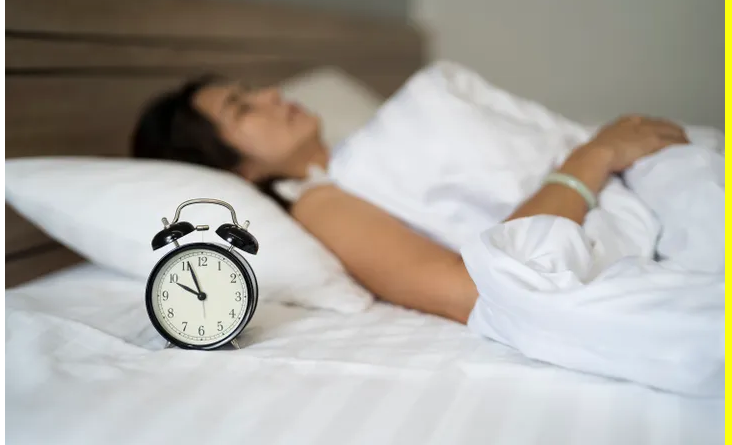Is A 10pm Bedtime Really The Holy Grail? We Asked The Experts
What time do you put yourself to bed? Are your lights out at a sensible hour or do you spend hours scrolling your phone until your eyes start drooping?
The latter might be a sign of revenge bedtime procrastination – the “voluntary delaying of sleep time” often seen in people with a busy schedule and a real (or perceived) lack of free time.
But there’s good reason to go to sleep earlier. A study has found that heading to bed between the sweet spot of 10-11pm could reduce your chance of developing heart disease.
Conducted by the University of Exeter, the study surveyed 88,026 people between 2006 to 2010, and found that dozing off after midnight is associated with a 25% higher chance of developing cardiovascular disease. Among those who went to sleep before 10pm, the risk was also found to be 12% higher.
In contrast, the number of people who developed heart problems was lowest among those who went to sleep between 10-11pm, leading researchers to identify this as the magic bedtime hour.
As study author Dr David Plans explains, the body has a 24-hour internal clock, called circadian rhythm, that helps regulate physical and mental functioning.
“Wile we cannot conclude causation from our study, the results suggest that early or late bedtimes may be more likely to disrupt the body clock, with adverse consequences for cardiovascular health,” Dr Plans said.
“Our study indicates that the optimum time to go to sleep is at a specific point in the body’s 24-hour cycle and deviations may be detrimental to health. The riskiest time was after midnight, potentially because it may reduce the likelihood of seeing morning light, which resets the body clock.”
As a team of journalist with a range of different bedtimes, we reached out to some sleep experts to find out whether a 10pm bedtime is the holy grail.
Sammy Margo, chartered physiotherapist and sleep expert, tells HuffPost UK there is no ideal sleep time as different people have different needs. “Some are night owls, others are more lux,” he says. “But, as the study suggests, and it’s an absolutely massive study, an ideal time may be 10pm.”
However, what matters most in terms of sleep is consistency.
“There’s loads of things about sleep we don’t know but we do know that in modern times, six to eight hours is optimal,” Margo adds. “So if you go to bed at 10pm, it means you wake up at 6am or a bit later. This doesn’t suit everyone as some people are early risers and others are not. Humans like rhythm and routine, so going to bed routinely every night is what’s really important.”
As many people are still working from home, reducing their commute and with it their need to wake up earlier, some of us may be getting more sleep than they need. “Oversleeping is as bad as under-sleeping so it’s about finding the optimal time the produces a good quality of sleep. And it’s better to even have shorter quality sleep than longer interrupted sleep,” Margo adds.
But when it comes to his own bedtime routine, he does subscribe to the study’s findings. “I go to bed at 10pm and it works for me, the quality of sleep is better,” he says. “Packing in the hours before 12am rings true – going to sleep before midnight is critical to your general wellbeing.”
Meanwhile, Dr Andrew Bagshaw, co-director of the University of Birmingham’s Centre for Human Brain Health, agrees that while the Exeter study’s findings provide good guidance, what works for individuals might differ.
“It’s variable between people, but most adults need between six to nine hours of sleep per night, with the average being around eight hours,” he tells HuffPost UK. “Most people work something like a 9-5 day, so might need to get up around 6-7am. Put those together, and to achieve the amount of sleep they need most, people might want to go to bed around 11.”
Not getting those hours in can have a hugely detrimental effect on the body, he adds – so there are two things you should keep in mind in terms of bedtime.
“One is getting the amount of sleep that you need and the fact that if you get less than you need, you will suffer negative consequences: reduced cognitive functioning, poorer emotion regulation, higher risk for poor mental health, higher risk of weight gain, diabetes and cardiovascular problems,” he says.
But there’s another issue: alignment between a person’s internal body clock and the societal day they need to adhere to for their job and commitments.
As Dr Bagshaw explains: “We all have a preference for when we sleep and wake, which is partly genetically controlled and partly learned habits. Some people naturally sleep and wake early (eg. 9pm bedtime, 5am wake time); some late (in the extreme, 3am bedtime, midday wake time). The majority of people are in the middle of these extremes.”
Not everyone’s body clock is in sync with societal expectations. “It is the late people who generally fit less well with the societal day, as they either get less sleep to wake at the time they need to for work, or they follow a schedule that doesn’t fit with their internal clock (ie. they are misaligned),” he says.
“Misalignment between internal time and the societal day has similar negative impacts to lack of sleep. So ideally, in order to function well cognitively, to have stable emotions and good mental wellbeing, to reduce risks of weight gain, diabetes and cardiovascular problems, people would not only achieve the sleep they need, but also at the time that fits best with their internal clock.”
Have you figured out your circadian rhythm? Now might be the time for some healthy clock-watching. Your heart – even your boss – may thank you for it.
Source:https://www.huffingtonpost.co.uk/entry/is-10pm-the-best-bedtime_uk_618a84cee4b0a518aca61c7f?utm_medium=10today.uk.rd.20211111&utm_source=email&utm_content=article&utm_campaign=10fortoday4.0styling




